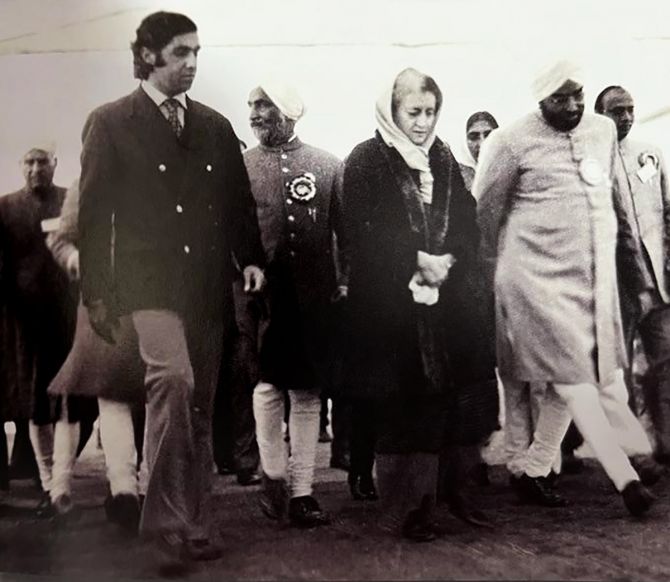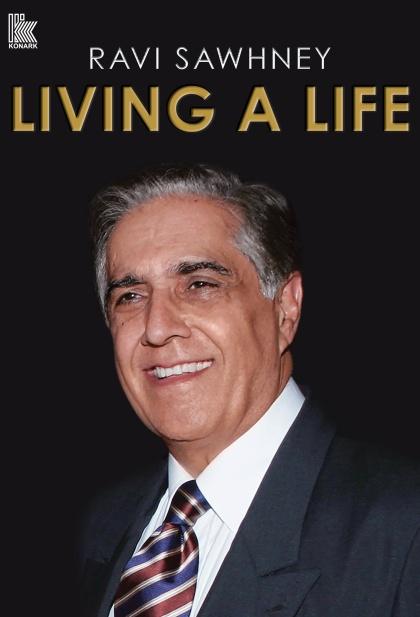'The Centre and state need to take a unified approach and take concerted action before this matter assumes menacing proportions because unemployment, the drug trade and the levels of frustration among the youth make them vulnerable to any maverick who promises something better.'

Ravi Sawhney went to Punjab as a young IAS officer in 1969 and spent the next two decades in what turned out to be an eventful, useful and memorable experience in public service.
During the tumultuous early 1980s in Punjab, he dealt with explosive events such as the assassination of Editor Lala Jagat Narain and the detention of Jarnail Singh Bhindranwale.
Born in Abbotabad, his family moved to Punjab in 1946. He was educated at Bishop Cotton, Shimla, St Stephen's College and earned an LLB from Delhi University before joining the IAS.
A star athlete, he also had the distinction of substituting for legendary sprinter Milkha Singh at an athletic meet in Colombo. He beat the Sri Lankan national champion in the 400 metres race in Kandy.
Initially reluctant to join the civil services, Mr Sawhney served 20 years in Punjab with stints in Delhi and the next 20 years as an international civil servant. He later served in the United Nations.
Belonging to an older and vanishing tribe of rare IAS officers, Mr Sawhney has written an engaging memoir Living a Life which gives a fascinating account of a rich professional experience with warm vignettes from his personal life.
'The memoirs of civil servants are important documents of social, political and cultural history,' wrote friend and fellow Punjab cadre IAS Amitabha Pande about Living a Life in The Tribune.
'The structure of the IAS was designed to enable officers to cultivate and nurture multifacetedness and it was precisely this what made IAS officers of the generation to which Ravi belonged so unique,' Pande pointed out.
Post-retirement, Ravi Sawhney settled down in Thailand. Living a Life is recommended reading for aspirants and young officers in service providing anecdotes to deal with politicians, beat governmental inertia or cut red tape.
"It is a myth that there is no scope for innovative thinking or enterprise in government service," says Sawhney who gathered a wealth of national and international experience as a civil servant.
The IAS, he believes, offers immense opportunities to do the extraordinary and make significant contribution to public service as perhaps no other profession.
"One needs to have the courage of one's convictions," he says in a multi-part telephone interview to Rediff.com's Archana Masih from Bangkok.

What were some of the challenges faced by you as an IAS officer in administering a district during President's Rule, conducting elections subsequently and, of course, dealing with Bhindranwale?
One of my first responsibilities as DC Ludhiana was to conduct the assembly election. The Congress came to power and the Akali Dal started the agitation demanding the implementation of the Anandpur Sahib Resolution.
My book covers anecdotes and episodes which I had to deal with whether it was the killing of Editor Lala Jagat Narain while he was transiting to Jalandhar by car, or the detention of Jarnail Singh Bhindranwale or the Akali leaders's Jail Bharo movement...
Ludhiana became the epicentre of the Akali agitation which Bhindranwale was using as a platform to carry out his agenda.
The Dharm Yudh Morcha that he launched in 1982 was ostensibly, to implement the Anandpur Sahib Resolution, but the agenda was much more sinister -- to seek autonomy for Punjab within the State of India.
Bhindranwale was able to attract a lot of the youth, because his agenda was buttressed with all kinds of other demands.
You mention in the book the popularity Bhindranwale enjoyed and how the road leading up to his detention centre was like a carnival.
What similarities do you see between then and Amritpal Singh's emergence in Punjab?
Being away from Punjab, I really don't know the ground realities and would not hazard an opinion or say anything which might sound judgmental.
But there does seem to be some similarity between what was happening during Bhindranwale's time and what is happening now. We seem to also be making some of the same mistakes that were made at that time.
Bhindranwale rode on the Akali agitation and used that as a platform; while Amritpal joined with the farmers agitation. But subsequent events showed that his demand was much more sinister.
Observing from a distance, I feel that some situations should never have been allowed to happen.
One of the problems during Bhindranwale's time was the lack of timely, effective action before the problem assumed menacing proportions. Bhindranwale moved around Punjab with impunity with truckloads of militants.
The Amritpal episode at Ajnala police station and the rampage that took place once again showed the state's unwillingness to take effective action. It almost looked like there was an absentee government in Punjab.
The problem in both these situations was the lack of unified action and coordination between the Centre and the state.
Law and order is a state subject, but in a border state, the Centre cannot be seen to be abdicating its responsibility. I'm not saying it is, but that Centre has to be fully involved in assuring the security of the country because there are signs of support filtering in from across the border.
Hence, the Centre becomes a much a major player.
The Centre and state need to take a unified approach and take concerted action before this matter assumes menacing proportions because unemployment, the drug trade and the levels of frustration among the youth make them vulnerable to any maverick who promises something better.
It is a volatile situation. Hopefully, it will be effectively handled.
What are the fault lines in Punjab that the state and Union government need to be careful and cautious about to prevent the emergence of people like Amritpal Singh?
Such situations should not be politicised, unfortunately, it all becomes highly politicised and we lose sight of the main issue. Then the blame game starts which does not serve any purpose.
There has to be an understanding that there is a problem which needs to be eliminated.
It is important that Punjab has to have a very effective administration, fully backed by the Centre.

Based on your two-decade experience in Punjab, how is the state politically, socially and historically different from other states?
What are its strengths, weaknesses, sensitivities, vulnerabilities in terms of being a border state which has had elements that have espoused separatist sentiments time to time?
I went to Punjab as an IAS officer in 1969. This was soon after the division of the state into Punjab and Haryana.
Yes, one of the important factors about Punjab is that it is a border state which was divided between India and Pakistan during Partition. It has experienced the violent effects of Partition.
It is also a state which saw rapid agricultural development and the government at that time built infrastructure which enabled it to emerge from a very difficult post-partition situation to a progressive state.
During my early years, Punjab was considered one of the better administered states. My experience as a young officer was that it was very effectively managed by a committed bureaucracy with an impetus on development.
The Government of India has started the marginal farmers and country labourers scheme and I was involved in helping the poorest sections of the rural community at the grass root level.
Punjab was a stable state, therefore, the conditions were conducive to doing very useful work.
I was fortunate that through my career in Punjab, I was mostly involved in operational work and spent very little time in the secretariat.
I had opportunity to work both in rural development as well as industrial development which gave me the opportunity to set up industries and diversify its economy.
The state of Haryana had been carved out of Punjab just a couple of years before you joined as a civil servant in the state. What were those early days of administration and policy making like?
Punjab was basically an agricultural state and source of the country's food grain. As the granary of India, the state was producing grain at a certain cost because a major part of its electricity and power was being used for agriculture, and not for industry.
Punjab was working towards the national interest, perhaps at the cost of its own economy. It had not diversified its economy as much as it should have.
People from Punjab were exporting knitwear to the Soviet Union and had small machineries in the garment and agriculture sector, but high technology industry was hardly present.
When I was in the industrial development department, I saw an opportunity to create infrastructure for industry and we ventured into the electronics sector to help Punjab diversify its economy.

Your book is considered essential reading for UPSC aspirants and young civil servants.
What are your thoughts on the implications of the killings of a gangster-politicians live on television and lessons for those entrusted with maintaining law and order?
I will not speculate, but there was a tremendous, terrible, lapse of security and intelligence. One should never compromise on security when there's a threat perception.
For example, as deputy commissioner in Ludhiana, I was responsible for Prime Minister Indira Gandhi's visit when she came to address a public gathering. The helicopter was to land at the grounds of the Government College for Women. She was to then proceed to the stadium.
The Congress leaders wanted to welcome her when she landed and I refused because we couldn't assure full security at that spot.
Hence, only the state president of the Congress was told to receive her and the rest were to greet her at the stadium. They were very upset, but I could not compromise.
Actions like these set the tone of an officer's way of functioning. One should not get subdued by any kind of political pressure.
The accused [Atiq Ahmed] had been saying that he was getting death threats and yet the duo was allowed to walk that distance and interact with the press.
They should not have been handcuffed together.
It was definitely a terrible lapse of security and gives a bad image to the administration.
Feature Presentation: Aslam Hunani/Rediff.com










